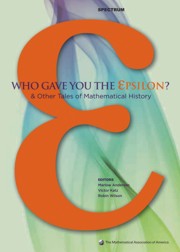Book contents
- Frontmatter
- Introduction
- Contents
- Analysis
- Geometry, Topology and Foundations
- Foreword
- Gauss and the Non-Euclidean Geometry
- History of the Parallel Postulate
- The Rise and Fall of Projective Geometry
- Notes on the History of Geometrical Ideas
- A note on the history of the Cantor set and Cantor function
- Evolution of the Topological Concept of “Connected”
- A Brief, Subjective History of Homology and Homotopy Theory in this Century
- The Origins of Modern Axiomatics: Pasch to Peano
- C. S. Peirce's Philosophy of Infinite Sets
- On the Development of Logics between the two World Wars
- Dedekind's Theorem:√2 × √3 = √6
- Afterword
- Algebra and Number Theory
- Surveys
- Index
- About the Editors
On the Development of Logics between the two World Wars
from Geometry, Topology and Foundations
- Frontmatter
- Introduction
- Contents
- Analysis
- Geometry, Topology and Foundations
- Foreword
- Gauss and the Non-Euclidean Geometry
- History of the Parallel Postulate
- The Rise and Fall of Projective Geometry
- Notes on the History of Geometrical Ideas
- A note on the history of the Cantor set and Cantor function
- Evolution of the Topological Concept of “Connected”
- A Brief, Subjective History of Homology and Homotopy Theory in this Century
- The Origins of Modern Axiomatics: Pasch to Peano
- C. S. Peirce's Philosophy of Infinite Sets
- On the Development of Logics between the two World Wars
- Dedekind's Theorem:√2 × √3 = √6
- Afterword
- Algebra and Number Theory
- Surveys
- Index
- About the Editors
Summary
1 Introduction
Logic is a disparate topic, occurring in almost any field of human activity without appearing to have much character of its own. Traditionally it was associated largely with methods of reasoning and regarded as encapsulated in the principles of syllogistic logic. It was the concern mostly of philosophers and developed in the context of rather general questions. During the second half of the nineteenth century there was especial concern with connections with psychology. For example, some authors maintained that psychology is a descriptive theory concerned with how we think, while logic is a normative discipline about how we ought to think (see [74] for the case of Mill).
Mathematics began to play a signi?cant role in logic with Boole's work around 1850 on Boolean algebra. From the technical point of view his work increased the scope of reasoning; and his contemporary De Morgan and successors Peirce and Schröder moved still further beyond the con?nes of syllogistic logic when they developed a theory of relations in their algebraic logic. Otherwise, however, the generality of concern remained; for example, Boole saw his own logic as concerned with the workings of the mind.
A different tradition was instituted around 1880 with the mathematical logic of Frege and Peano, and its development by Russell and Whitehead. Not only is the logic itself rather different in form; the motivations lie in specific questions in the foundations of mathematics, in contrast to the general concerns indicated above for otherlogicians.
- Type
- Chapter
- Information
- Who Gave You the Epsilon?And Other Tales of Mathematical History, pp. 172 - 184Publisher: Mathematical Association of AmericaPrint publication year: 2009



